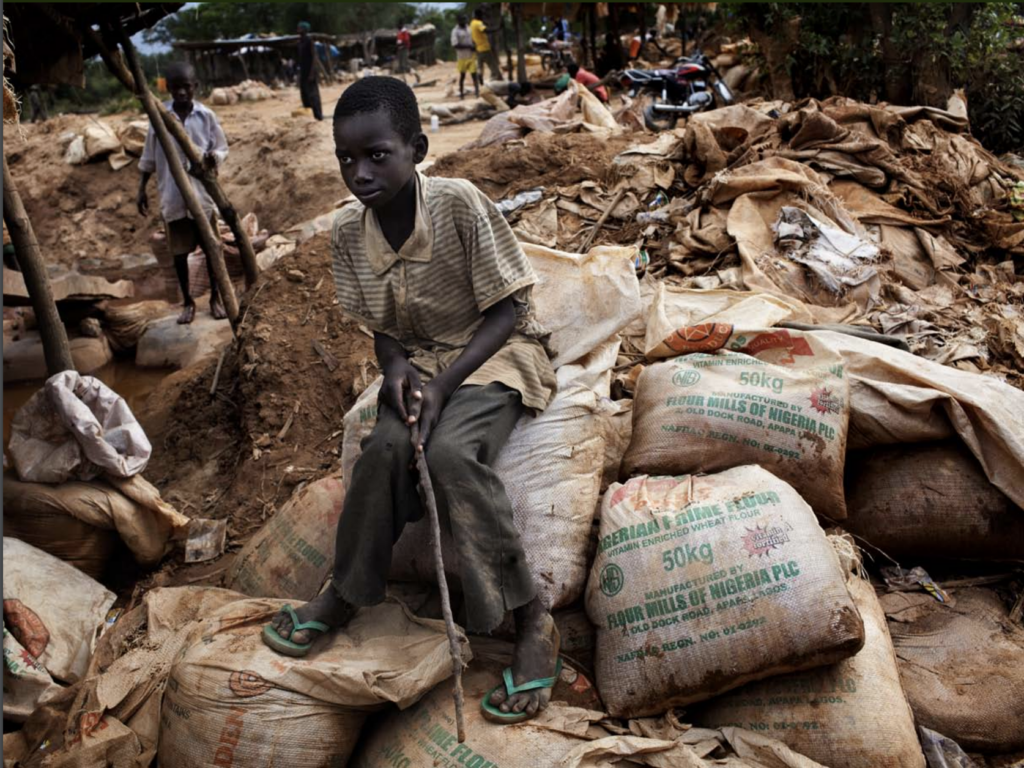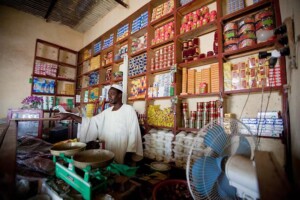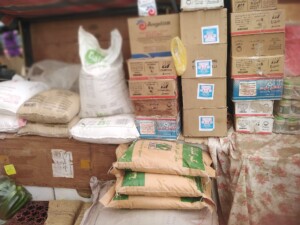Sudan gold miners protest over fivefold fee increase

A young boy sits on a stack of ore sacks, like the ones used in Sudan, in a mining processing site in Nigeria (Marcus Bleasdale / Human Rights Watch)
HAYA / ABU HAMAD – March 7, 2023
Gold miners in Red Sea state and Blue Nile state are protesting the decision of the Sudanese Company for Mineral Resources to pursue a fivefold increase in the fees of a 100kg sack of rocks containing gold ore at the gates of the mining markets. The miners threaten to escalate their protests if authorities do not back down.
Miners in the area of Wadi El Oshar in Haya in Red Sea state threatened go on strike if the responsible authorities do not back down from their decision, freelance journalist Abdallah El Nour reported to Radio Dabanga.
The miners are working for private mining companies, but at the same time attempt to earn more by searching for gold themselves, El Nour explained.
The Red Sea state Miners’ Union announced the closure of goldmining markets in Jebeit and Haya in protest against the decision of the Sudanese Company for Mineral Resources to increase the fees per 100kg sack of rocks from SDG400 to SDG2,000.
Radio Dabanga spoke with union leader Adarob El Hasan, who accused the Sudanese Company for Mineral Resources and several private mining companies of exploiting the mine workers and seeking to get rid of them with the aim of controlling the mining areas.
He told Radio Dabanga that the mineral resources company, presided by Mubarak Ardol, has also proceeded to close all the entrances and exits of the mining markets, and to keep only one door in order to control the mining outlets.
The decision will lead to the collapse of mining in the region and the displacement of the simple people who support their families with this profession, El Hasan said.
El Hasan further explained that Sudanese Company for Mineral Resources approved only seven per cent for the development of the Red Sea state from the state’s resources.
The miners’ resist the company’s decisions and the union leader said: “We will not allow them to mine in these areas. We will guard all gates and close them”.
Red Sea state has recently witnessed significant tensions around the behaviour of mining companies and mining practices in which highly toxic chemicals are used. Local residents fear that their drinking water supply is at risk and professionals have warned of a looming environmental and health disaster.
Basins with mining waste (called karta in Sudan), in which gold ore is dumped containing heavy metals such as admium, lead, zinc, copper, arsenic, selenium, and mercury or cyanide, form a long-term hazard second only to nuclear waste dumps.
Unfair
Miners and mine owners in Abu Hamad, River Nile state, also protested the 500 per cent increase in fees.
Waleed Shaw, Secretary-General of the Mining Sector of the Free Businesses Union in Abu Hamad, described the fivefold increase in fees as “unfair”.
Abu Hamed market is one of the largest mining markets in Africa. “The decision to raise the fees will affect about five million miners,” Shaw explained.
‘The decision to raise the fees will affect about five million miners’
“The fees will lead to the exit of a number of miners,” he said, “as they already live in dire conditions due to the lack of services and security”.
The local union leader threatened to escalate their protests “if the decision is not reversed” and predicted that “all gold miners in Sudan will lay down their tools in protest against the ridiculous new fees”.
Politics and smuggling
The daily reap of gold is estimated at about $0.6 billion per day. However, Shaw accused authorities of maintaining illegal trade in gold, pointing to “certain sides that contribute to the smuggling of gold, including the Sudanese Company for Mineral Resources and the Ministry of Energy and Mining”.
Sudan is reportedly the second largest gold producer in Africa and gold is its largest export commodity. The production however is often driven by unregulated, artisanal (individual subsistence) mining, and routine gold smuggling across international borders is a constant problem.
Money made through smuggling does not end up in the national treasury and will not be invested in developments to benefit Sudan’s inhabitants
It is estimated that between 50 per cent and 80 per cent of Sudan’s gold is smuggled out of the country. Proceeds have reportedly been used to finance the internal conflicts.
In July 2022, CNN published an investigation disclosing how “Russia is plundering gold in Sudan to boost Putin’s war effort in Ukraine” with the complicity of Sudanese military rulers, who took power in a military coup in October 2021.











 and then
and then